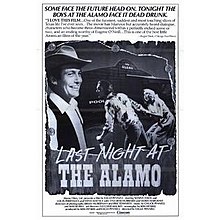
The Battle of San Jacinto, fought on April 21, 1836, in present-day La Porte and Deer Park, Texas, was the final and decisive battle of the Texas Revolution. Led by General Samuel Houston, the Texan Army engaged and defeated General Antonio López de Santa Anna's Mexican army in a fight that lasted just 18 minutes. A detailed, first-hand account of the battle was written by General Houston from the headquarters of the Texan Army in San Jacinto on April 25, 1836. Numerous secondary analyses and interpretations have followed.

The Battle of the Alamo was a pivotal event and military engagement in the Texas Revolution. Following a 13-day siege, Mexican troops under President General Antonio López de Santa Anna reclaimed the Alamo Mission near San Antonio de Béxar, killing most of the occupants. Santa Anna's refusal to take prisoners during the battle inspired many Texians and Tejanos to join the Texian Army. Motivated by a desire for revenge, as well as their written desire to preserve a border open to immigration and the importation and practice of slavery, the Texians defeated the Mexican Army at the Battle of San Jacinto, on April 21, 1836, ending the conquering of the Mexican state of Coahuila y Tejas by the newly formed Republic of Texas.
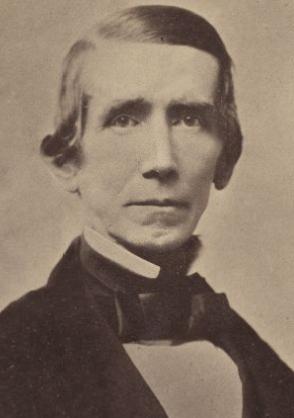
James Pinckney Henderson was an American and Republic of Texas lawyer, politician, and soldier, and the first governor of the State of Texas.

Urban Cowboy is a 1980 American romantic Western film directed by James Bridges. The plot concerns the love-hate relationship between Buford "Bud" Davis and Sissy. The film's success was credited for spurring a mainstream revival of country music. Much of the action revolves around activities at Gilley's Club, a football-field-sized honky tonk in Pasadena, Texas.

The Alamo is a 2004 American war historical drama about the Battle of the Alamo during the Texas Revolution. The film was directed by John Lee Hancock, produced by Ron Howard, Brian Grazer, and Mark Johnson, distributed by Buena Vista Pictures, and starring Dennis Quaid as Sam Houston, Billy Bob Thornton as Davy Crockett, Jason Patric as Jim Bowie, and Patrick Wilson as William B. Travis. The screenplay is credited to Hancock, Stephen Gaghan, and Leslie Bohem.

The Alamo is a 1960 American epic historical war film about the 1836 Battle of the Alamo produced and directed by John Wayne and starring Wayne as Davy Crockett. The film also co-stars Richard Widmark as Jim Bowie and Laurence Harvey as William B. Travis, and features Frankie Avalon, Patrick Wayne, Linda Cristal, Joan O'Brien, Chill Wills, Joseph Calleia, Ken Curtis, Ruben Padilla as Santa Anna, and Richard Boone as Sam Houston. Shot in 70 mm Todd-AO by William H. Clothier, it was released by United Artists.

The Return of the Texas Chainsaw Massacre is a 1995 American slasher black comedy film written, co-produced, & directed by Kim Henkel. It is the fourth installment in The Texas Chainsaw Massacre film series. The film stars Renée Zellweger, Matthew McConaughey, and Robert Jacks. The plot follows four teenagers who encounter Leatherface and his murderous family in backwoods Texas on the night of their prom. It features cameo appearances from Marilyn Burns, Paul A. Partain, and John Dugan, all stars of the original film.
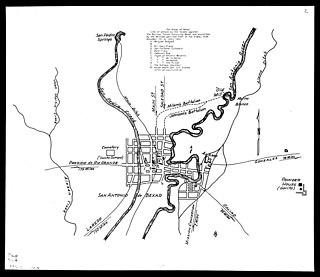
The siege of Béxar was an early campaign of the Texas Revolution in which a volunteer Texian army defeated Mexican forces at San Antonio de Béxar. Texians had become disillusioned with the Mexican government as President and General Antonio López de Santa Anna's tenure became increasingly dictatorial. In early October 1835, Texas settlers gathered in Gonzales to stop Mexican troops from reclaiming a small cannon. The resulting skirmish, known as the Battle of Gonzales, launched the Texas Revolution. Men continued to assemble in Gonzales and soon established the Texian Army. Despite a lack of military training, well-respected local leader General Stephen F. Austin was elected commander.

Bug is a 2006 psychological horror film directed by William Friedkin and written by Tracy Letts, based on his 1996 play of the same name. The film stars Ashley Judd, Michael Shannon, Lynn Collins, Brían F. O'Byrne, and Harry Connick Jr.
Gaston Méliès was a French film director who worked primarily in the United States. He was the brother of the film director Georges Méliès.
Kim David Henkel is an American screenwriter, director, producer, and actor. He is best known as the co-writer of Tobe Hooper's horror film The Texas Chain Saw Massacre.

The Alamo Drafthouse Cinema is an American cinema chain founded in 1997 in Austin, Texas, which is famous for serving dinner and drinks during the movie, as well as its strict policy of requiring its audiences to maintain proper cinema-going etiquette.

The culture of Texas is very diverse, influenced by tremendous waves of migration out of the American North and West, in contrast to its eastern neighbors in the Deep South. It includes the regionalisms and distinct cultural identities of German Texan, Tejanos, Cajuns, Irish, African American, and White Southern enclaves established before the republic era and admission to statehood.
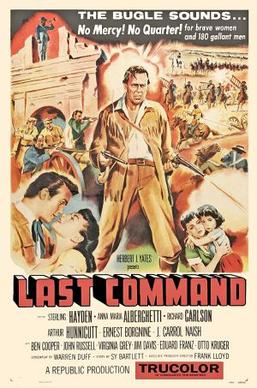
The Last Command is a 1955 American Western film directed by Frank Lloyd starring Sterling Hayden, Anna Maria Alberghetti, Richard Carlson, Arthur Hunnicutt, Ernest Borgnine and J. Carrol Naish based on the life of Jim Bowie and the Battle of the Alamo.

The culture of San Antonio reflects the history and culture of one of the state's oldest and largest cities straddling the regional and cultural divide between South and Central Texas. Historically, San Antonio culture comes from a blend of Central Texas and South Texas (Southwestern) culture. Founded as a Spanish outpost and the first civil settlement in Texas, San Antonio is heavily influenced by Mexican American culture due to Texas formerly being part of Mexico and, previously, the Spanish Empire. The city also has significant German, Anglo, and African American cultural influences. San Antonio offers a host of cultural institutions, events, restaurants and nightlife in South Texas for both residents and visitors alike.

Eagle Pennell was an American independent filmmaker. His film The Whole Shootin' Match (1978) is often credited with inspiring Robert Redford to start the Sundance Institute.
Louis Byron Perryman, also known as Lou Perry, was an American character actor. He acted in a number of small roles both on television and in films such as The Blues Brothers, Poltergeist, Boys Don't Cry and The Texas Chainsaw Massacre 2.

Lonesome Dove is a 1989 American epic Western adventure television miniseries directed by Simon Wincer. It is a four-part adaptation of the 1985 novel of the same name by Larry McMurtry and is the first installment in the Lonesome Dove series. The novel was based upon a screenplay by Peter Bogdanovich and McMurtry. The miniseries stars an ensemble cast headed by Robert Duvall as Augustus McCrae and Tommy Lee Jones as Woodrow Call. The series was originally broadcast by CBS from February 5 to 8, 1989, drawing a huge viewing audience, earning numerous awards, and reviving both the television Western and the miniseries.
The Whole Shootin' Match is a 1978 American independent film directed and co-written by Eagle Pennell, and starring Sonny Carl Davis, Lou Perryman, and Doris Hargrave. The black-and-white film was originally shot in 16 mm. The film was restored and distributed on DVD by Watchmaker Films in 2006.
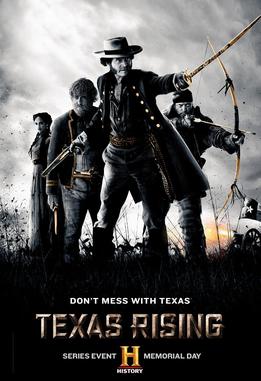
Texas Rising is a 2015 History Channel five-part television miniseries based on the Texas Revolution against Mexico and how the Texas Rangers were created. It was directed by Roland Joffé and premiered on May 25, 2015. The series stars Bill Paxton, Jeffrey Dean Morgan, Ray Liotta, Brendan Fraser, Olivier Martinez and Cynthia Addai-Robinson.
